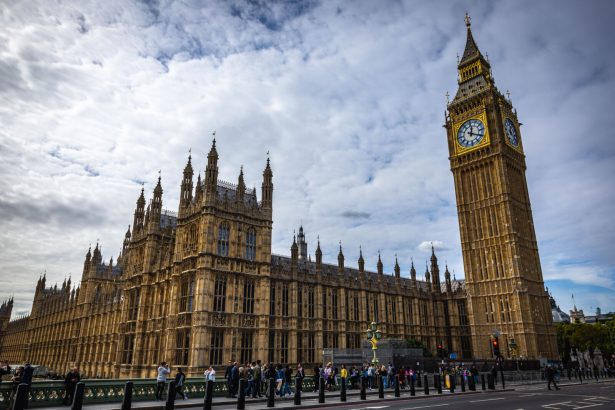Tom Harris was Labour MP for Glasgow South from 2001 to 2015. He argues that Labour is wasting time trying to appease the unappeasable which can only lead to the surrender of our values and the betrayal of our true friends. The editors invite responses to this and other articles about Labour’s policy shifts published in Fathom.
Governments of all parties have, in the past, been able to pursue foreign policy objectives relatively free from domestic concerns. Foreign policy is not an issue that has traditionally figured high in voters’ priorities; this was the case even with regard to the Iraq invasion of 2003, given that there was a broad consensus at the time between Labour and Conservative, both of which supported the invasion. And Labour won re-election after the war had begun.
But 2024 feels different, because this Labour government and party feels different from what has gone before. Labour governments led by Tony Blair and Gordon Brown could be relied upon to offer political and military support to Israel in its struggle to combat the various militant forces ranged against it. There was always a vocal pro-Palestinian faction in the party, and in a Venn diagram of ‘pro-Palestine’ and ‘hard Left’ Labour members, there was an awful lot of overlap, which made it easier for successive leaders to continue to offer support to Israel.
But that started to change with the election of Ed Miliband as party leader following Labour’s ejection from office in 2010. In his first conference speech as leader, Miliband generously announced that Israel had the right to exist – a peculiar statement, since he felt no compunction to say the same thing about any other nation. But Miliband’s equivocation on Israel, a product of his desire to flirt with the Left that had given him the edge over his older brother in the leadership contest, only presaged what was yet to come.
Jeremy Corbyn’s election as leader in 2015, as well as confirming to the world that Labour was no longer a party to be taken seriously, represented an earthquake as far as the party’s relationship with Israel was concerned. At his first conference after becoming leader, he attended the Labour Friends of Israel reception, but in his short speech couldn’t even bring himself to mention the word ‘Israel’. On the plus side, he didn’t copy Miliband’s mistake of declaring Israel’s right to exist, though probably for different reasons than his predecessor.
Keir Starmer’s initial political instinct, in the aftermath of the Hamas terror attacks on Israel last October, were sound and based on Labour’s traditions of solidarity with the only democratic, liberal democracy in the Middle East. For a while, his staunch support for the attack by the IDF on Hamas strongholds in Gaza held firm. But it perhaps says much about Starmer’s inexperience in frontline politics that it wasn’t long before he started to cave in to the loudest opposition voices in his party, and started to backtrack on his previous opposition to a ceasefire.
But when the general election came in July, no backtracking on Israel’s right to hunt down those responsible for the massacre of 1200 Jews and the kidnapping of 250 others was enough to assuage an element of militant Muslim opinion in Britain, whose voices had been amplified by weekly demonstrations at which the most foul anti-Semitism had been on regular display. Now they swapped public demonstrations for the ballot box: four previously ‘safe’ Labour constituencies fell to pro-Gaza candidates, including the Leicester seat of leading shadow cabinet member Jonathan Ashworth.
Now it wasn’t just public order and Jewish citizens’ sense of safety that was being threatened: this was much worse – now Labour votes were being threatened!
Perhaps it is too cynical to draw a causal line between Labour’s nervousness about losing ground domestically in a section of the electorate on which it had previously been able to count, and the new Labour government’s undeniable withdrawal of support from Israel via a number of policy announcements. So call me cynical.
First, we had the decision to drop Britain’s objections to the issuing of an arrest warrant for ‘war crimes’ against Israeli prime minister, Benjamin Netanyahu, a move that created a serious disagreement between Britain and our strongest and most important ally, the United States.
Then there was foreign secretary David Lammy’s announcement that the government would reinstate funding to the UN Palestinian refugee organisation UNRWA, despite allegations that UNRWA personnel took an active part in the 7 October pogrom.
And then we had the announcement that some arms-based exports to Israel by British firms would be halted.
In none of these cases can we see any similarity with what previous Labour governments would have done. But the case for concluding that these policies have been pursued specifically in order to assuage Muslim opinion in the UK is convincing, if not overwhelming. Labour has form on this, after all. During the Batley and Spen by-election in 2021, the party avoided at all costs even mentioning the local grammar school teacher who was forced into hiding for his own safety after threats by Muslim protesters in response to his showing cartoons of Mohammed to his pupils. The issue strikes at the very heart of what role religion should play in an open, tolerant, liberal society, but it is one that no Labour MP, including the local one who actually represents the teacher, is willing to discuss.
When home office minister Jess Phillips seemed to justify the behaviour of Muslim men intimidating a lone female Sky News reporter during the summer’s race riots, it was clear that the government was giving a pass to some violent protesters and not to others, for reasons that were never openly admitted.
Assuming, perhaps unfairly, that the government’s approach to Israel has at least been influenced by domestic Muslim opinion (which in itself would be disgraceful and unacceptable) what do ministers hope to gain from such acquiescence?
In campaigners’ experience, will there ever be a point, short of declaring that Israel should abolish itself in favour of a Greater Palestine, that more extreme Muslim opinion is satisfied? How far must the government go along the path it has chosen before it starts to win back that lost support in northern and midlands seats?
The answer, of course, is that extremists tend to demand extreme things. Those who march each week for Palestine and who voted for pro-Gaza candidates at the general election will never, ever be satisfied with a government that does anything other than express complete opposition to Israel.
As an optimist I believe that even this government will never go that far; Starmer has failed Israel, under pressure from his party, but he remains personally committed to supporting its fight for survival.
But that means that any realistic attempt to appease the extremists will never succeed. Even support for a ‘two-state solution’ is seen by many pro-Palestinian activists as a concession too far to the ‘Zionist entity’, and one they could never tolerate.
By reasserting its principled support for Israel and by helping its efforts to remove Hamas as a player in Gaza, the government would be honouring its own liberal principles. It would also be sending an important signal to the pro-Palestine movement and the Islamists and terrorist apologists who dwell in its shadow: our principles of tolerance are not for sale, however many votes you think you can deprive us of.
It’s easy to dismiss the threat of a loss of votes and seats as if that doesn’t matter. Of course it does, and Labour needs to hold together its broad (though shallow) and diverse coalition of interests that put it into office this year if it is to win a second term. But there are more important things. British values of tolerance and liberality are not to be auctioned off in return for political support. Those values are non-negotiable, however much they might offend certain community leaders with their own medieval agendas.
Labour must rediscover its principles and – just as important – its international allies. Wasting time trying to appease the unappeasable can only lead to surrender of our own values and the betrayal of our true friends.



































